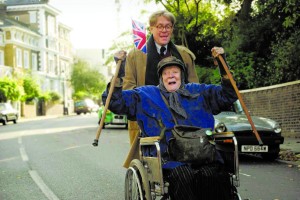The Lady in the Van
The Lady in the Van, 2015, 3 stars
Lady conveys metatheatrical charm
From The Orlando Weekly, February 10, 2016
British playwright Alan Bennett met Mary Shepherd when the elderly, homeless woman parked her dilapidated van outside his suburban London home in 1970. Almost 20 years later, the mysterious curmudgeon was still there and the two had formed an unlikely friendship, fostered by Bennett’s kindness and Shepherd’s stubborn refusal to seek shelter elsewhere.
But, as many good writers do, Bennett used the unusual relationship as inspiration for his 1989 book, The Lady in the Van, which he turned into a play 10 years later. And, like the new movie version, the theatrical production starred Maggie Smith and was directed by Nicholas Hytner, the former artistic director of London’s National Theatre (whom movie audiences will know as the helmer of The Madness of King George).
“I’m not a beggar. I’m self-employed,” Mary (Maggie Smith) tells the residents of the neighborhood in which she parks her van. “I’m a sick woman, dying possibly. I’m just looking for a last resting place.”
Surprisingly, she lives nearly two more decades, becoming increasingly reliant on Bennett for a cool friendship and use of his lavatory. Yet, in a way only Smith can convey, Shepherd maintains not just a stubborn pride but a “vagabond nobility.” She also clings to her privacy, and, indeed, Bennett discovers her true story and identity only at the end of the film.
Like its title character, The Lady in the Van is an odd duck, disguising itself as an inconsequential and quirky comedy for the first hour. Annoyingly overscored and chronologically confusing – with little suggestion of the passage of time – it lacks impact and relies too much on forgettable, though charming, moments of subtle humor. Characters come and go with little purpose except to provide cameos for Frances de la Tour and other cast members of Bennett’s play, The History Boys, which also became a film directed by Hytner. Jim Broadbent, as a mysterious acquaintance of Shepherd, is a nice addition, as always, but he’s mostly wasted, as is Roger Allam as Bennett’s neighbor.
The film belongs almost entirely to Smith, who, though superb, never steps too far out of her comfort zone. Nevertheless, she portrays the increasingly frail and bewildered Shepherd effectively, illustrating that “in life, going downhill is an uphill job,” as the film tells us. So charismatic is Smith that Alex Jennings, as Bennett, is relegated to the background even though the story is mostly about him. He provides the narration and the structure, in addition to some memorable, if slightly contrived, metatheatricality that suggests – both metaphorically and literally – that there are two Bennetts.
“The writer is double,” he says. “There is the self who does the writing. And there is the self who does the living. And they talk. They argue.”
The gimmick doesn’t always work, but it does give the film an air of intellectualism while keeping things stylistically interesting, until the superb conclusion finally brings everything into an emotionally satisfying and aesthetically pleasing focus. Yes, Van does experiences bumps in the road, but it finds its way in the end.
© 2016 Orlando Weekly / MeierMovies, LLC
